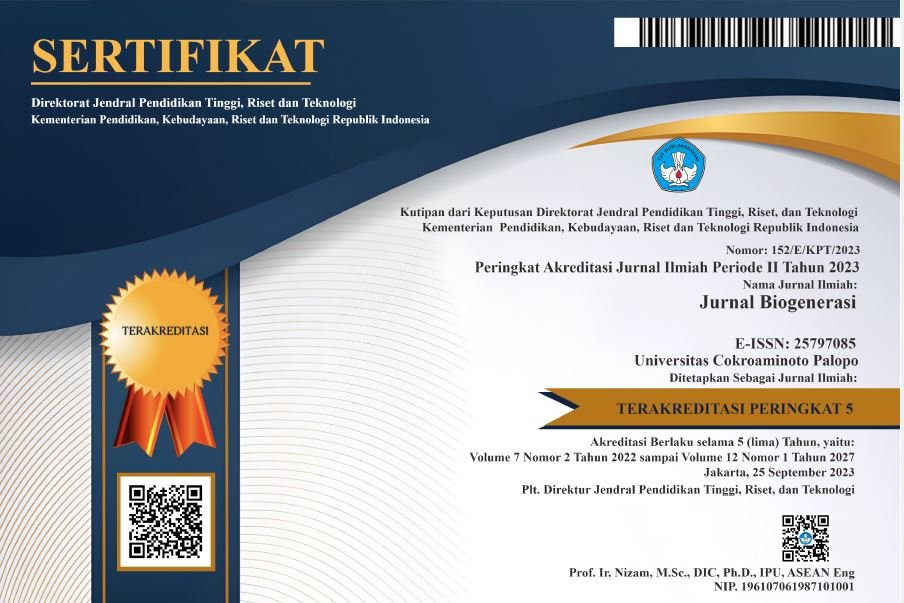Pengaruh E-Learning Moodle Terhadap Kemampuan Literasi Digital Mahasiswa STKIP Bima
DOI:
https://doi.org/10.30605/biogenerasi.v8i1.2588Abstract
Pandemi covid-19 melanda seluruh kabupaten/kota yang ada di Indonesia termasuk kota Bima Provinsi Nusa Tenggara Barat. Demi kelancaran kegiatan pembelajaran jarak jauh dimasa pandemi, program studi pendidikan biologi STKIP Bima mengembangkan pembelajaran elektronik (e- learning) jenis moodle melalui dana hibah Kemendikbudristek. Oleh karena itu dilakukannya penelitian ini dengan tujuan untuk mengetahui pengaruh penggunaan e-learning moodle terhadap kemampuan literasi digital mahasiswa program studi Pendidikan Biologi STKIP Bima. Penelitian ini merupakan penelitian eksperimen semu. Populasi seluruh mahasiswa program studi pendidikan biologi STKIP Bima semester I tahun pelajaran 2021/2022. Tekhnik pengambilan sampel dengan sampling random purposive sehingga diperoleh kelas D sebagai kelas eksperimen dan kelas E sebagai kelas kontrol. Instrumen pengumpul data berupa angket respon mahasiswa. Setelah itu data dianalisis dengan analisis statistik deskriptif. Berdasarkan hasil analisis data bahwa penggunaan e-learning moodle berpengaruh positif terhadap peningkatan kemampuan literasi digital mahasiswa program studi Pendidikan Biologi STKIP Bima yaitu berada dalam kategori sangat baik, baik dan cukup.
Downloads
References
Asyari, A., & Diani, R. (2017). Pembelajaran Fisika Berbasis Web Enhanced Eourse: Mengembangkan Web Longs Pembelajaran Fisika Dasar I. Jurnal Inovasi Teknologi Pendidikan, 49(1), 14-15.
Bonitasya, A.D., Widiyatmoko, A., & Sovansophal, K. (2021). The Effect of Blended Learning with a Collaborative Problem Solving Approach on Students’ Cognitive Learning Outcomes and Collaboration Skills in Science Learning. Jurnal Penelitian dan Pembelajaran IPA, 7(2), 152.
Daud F., & Rahmadana, A. (2015). Pengembangan Media Pembelajaran Biologi Berbasis E-Learning pada Materi Ekskresi Kelas XI IPA 3 SMAN 4 Makassar. Jurnal Bionature, 16 (1), 29-35.
Halimatusadiya., Dewi, K.A.R., & Khoimatun. (2022). Analisis Pelaksanaan Pembelajaran Daring pada Masa Pandemi Covid-19 di Sekolah Dasar. Jurnal Educatio, 8(1), 230.
Hayat, S.M., Erwin., & Permana, I. (2017). Strategi Evaluasi Program Perkuliahan Biologi Berbasis Blended Learning. Jurnal Bioedukatika, 5(2), 67.
Hekmah, N., Wilujeng, I., & Suryadarma, P.G.I. (2019). Web- LKS IPA Terintegrasi Lingkungan untuk Meningkatkan Literasi Lingkungan Siswa. Jurnal Inovasi Pendidikan IPA, 5(2), 135.
Herayanti, L., Fuaddunnazmi, M., & Habibi. (2017). Pengembangan Perangkat Pembelajaran Fisikan Berbasis Moodle. Jurnal Pendidikan Fisika dan Teknologi, 3(2), 200.
Pantiwati, Y., Wahyuni, S., & Permana, F.H. (2017). Instructional Model of Natural Science in Junior High Schools, Batu – Malang. Journal of Education and Practice, 8(8). 117-118.
Putra, K. W. B., Wirawan, I.M.A., & Pradnyana, G.A. (2017). Pengembangan EModul Berbasis Model Pembelajaran Discovery Learning Pada Mata
Pelajaran “Sistem Komputer” Untuk Siswa Kelas X Multimedia SMK Negeri 3 Singaraja. Jurnal Pendidikan Teknologi dan Kejuruan, 14(1). 47-48.
Riyadi, A.R., Nur, M., & Ismayati, E. (2015). Pengembangan Perangkat Pembelajaran Berbasis E-Learning Moodle dengan Model Pengajaran Langsung di SMKN 2 Tarakan. Jurnal Pendidikan Vokasi: Teori dan Praktek, 3(1), 64-69.
Sampurno, P.J., Maulidiyah, R., & Puspitaningrum, HZ. (2015). Implementasi Kurikulum 2013: MOODLE (Modular Object Oriented Dynamic Learning Environment) dalam Pembelajaran Fisika Melalui Lembar Kerja Siswa pada Materi Optik di SMA. Jurnal Fisika Indonesia, 19(55), 54-55.
Sobri, M., Nursapitini, N., & Novitasari, S. (2020). Mewujudkan Kemandirian Belajar Melalui Pembelajaran Berbasis Daring Diperguruan Tinggi pada Era Industri 4,0. Jurnal Pendidikan Glasser, 4(1), 64-71.
Susanti, H.B. (2019). Penggunaan Media Online dalam Proyek Pembuatan Bahan Ajar Berbasis Web pada Mata Kuliah Zoologi Vertebrata. Jurnal Edusains, 11(1), 22.
Tobing, L. W., & Pranowo, D.D. (2020). Blended Learning in French Intermediate Grammar Learning: is it effective? Jurnal Cakrawala Pendidikan, 39(3), 652.
Downloads
Published
How to Cite
Issue
Section
License
In submitting the manuscript to the journal, the authors certify that:
- They are authorized by their co-authors to enter into these arrangements.
- The work described has not been formally published before, except in the form of an abstract or as part of a published lecture, review, thesis, or overlay journal.
- That it is not under consideration for publication elsewhere,
- That its publication has been approved by all the author(s) and by the responsible authorities – tacitly or explicitly – of the institutes where the work has been carried out.
- They secure the right to reproduce any material that has already been published or copyrighted elsewhere.
- They agree to the following license and copyright agreement.
License and Copyright Agreement
Authors who publish with this journal agree to the following terms:
- Authors retain copyright and grant the journal right of first publication with the work simultaneously licensed under Creative Commons Attribution License (CC BY 4.0) that allows others to share the work with an acknowledgment of the work's authorship and initial publication in this journal.
- Authors are able to enter into separate, additional contractual arrangements for the non-exclusive distribution of the journal's published version of the work (e.g., post it to an institutional repository or publish it in a book), with an acknowledgment of its initial publication in this journal.
- Authors are permitted and encouraged to post their work online (e.g., in institutional repositories or on their website) prior to and during the submission process, as it can lead to productive exchanges, as well as earlier and greater citation of published work.



.png)

